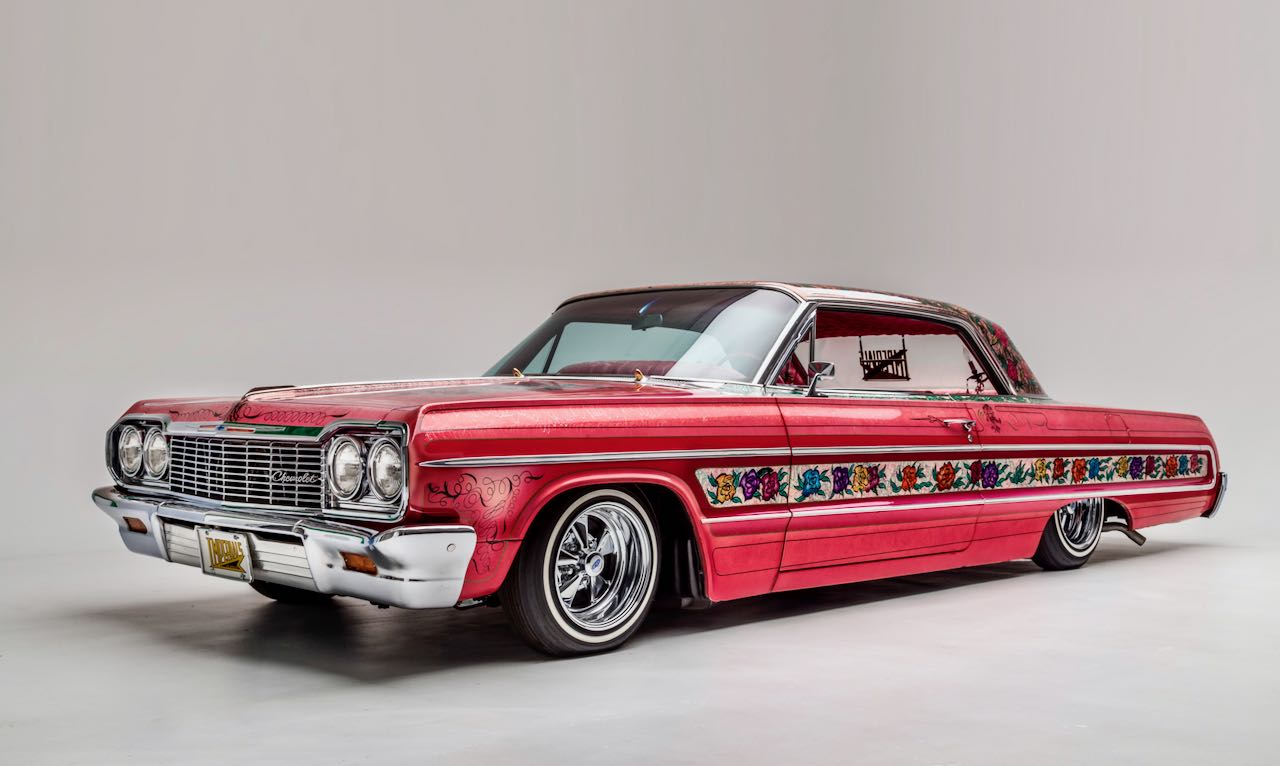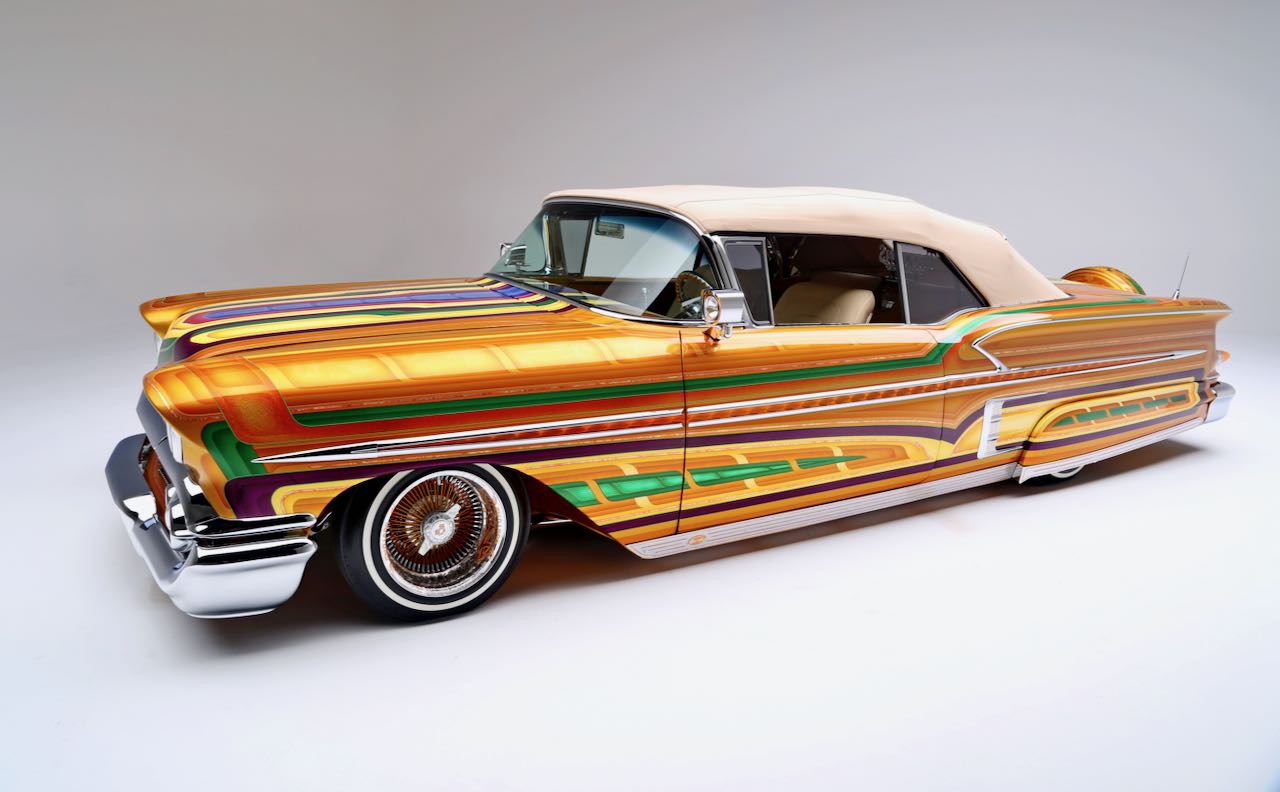| The Petersen Automotive Museum will celebrate the artistry, culture and history of lowriders with its largest and most comprehensive lowrider exhibit, set to open on May 11. “Best in Low: Lowrider Icons of the Street and Show” will showcase some of the most significant lowriders in history, as well as incredible custom motorcycles, bicycles and art.
Located in the Mullin Grand Salon, the exhibit will celebrate the creativity and unique identity of lowrider culture by highlighting the intricate and labor-intensive craftsmanship that goes into creating these mobile masterpieces. The display will showcase the techniques that have become a hallmark of the lowrider scene, including custom paint, engraving, gravity-defying suspension and plush upholstery. The exhibit will also feature artwork and photography from some of the most influential artists from the Chicano lowrider art scene today.
LOWRIDERS ROCK PETERSEN MUSEUM, with iconic vehicles including one of the world’s most famous lowriders, the ‘64 Chevrolet Impala known as “Gypsy Rose.” This ride earned its initial notoriety in the 1970s television sitcom Chico and the Man. In 2017, Gypsy Rose became the first lowrider to be inducted into the National Historic Vehicle Registry.
 Other notable lowriders include the ‘58 Chevrolet Impala convertible “Final Score” and ‘57 Chevrolet Bel Air “Double Trouble,” both three-time Lowrider magazine Lowrider of the Year award winners, as well as the ‘58 Chevrolet Impala “Dead Presidents,” built by Albert De Alba Sr. and Albert De Alba Jr., who are among the most established and respected craftsmen in the lowrider community. LOWRIDERS ROCK PETERSEN MUSEUM exhibit will also feature the ‘54 Chevrolet 210 Sedan “Sphinx,” an influential car in the Japanese lowriding community, and the “Twisted Toy” bicycle, a three-time Lowrider Bicycle of the Year, plus numerous other award-winning lowrider cars, motorcycles, bicycles and more. Other notable lowriders include the ‘58 Chevrolet Impala convertible “Final Score” and ‘57 Chevrolet Bel Air “Double Trouble,” both three-time Lowrider magazine Lowrider of the Year award winners, as well as the ‘58 Chevrolet Impala “Dead Presidents,” built by Albert De Alba Sr. and Albert De Alba Jr., who are among the most established and respected craftsmen in the lowrider community. LOWRIDERS ROCK PETERSEN MUSEUM exhibit will also feature the ‘54 Chevrolet 210 Sedan “Sphinx,” an influential car in the Japanese lowriding community, and the “Twisted Toy” bicycle, a three-time Lowrider Bicycle of the Year, plus numerous other award-winning lowrider cars, motorcycles, bicycles and more.
Lowriders emerged onto the Southern California automotive scene in the post-war era as unique symbols of personal creativity and cultural identity. While hot rodders concentrated on going fast, lowriders focused on cruising low and slow. Lowriders evolved into an expression of cultural pride in Southern California’s various Chicano communities by the late-1960s.
As the popularity of lowrider culture has grown both within the United States and beyond, this exhibition is a new chapter focused on the artistry and craftsmanship of lowrider cars and the impact of this culture on the customization scene. Los Angeles is often called the center of lowriding, and the city continues to be the dominant image of the culture both nationally and internationally. Though Chicanos/Latinos are often cited as the generators of the culture, African Americans, Asians, and members of other cultural groups participate in the lowriding scene, and all have contributed important innovations. Today, lowrider communities can be found across the United States from the West Coast to the Southwest, and even in Chicago, Kansas City and New York City. Internationally, there are lowrider communities in Japan, Brazil, Thailand and even France.
 “The lowrider displays are always a fan favorite, and we are excited to open the most comprehensive lowrider exhibit in the museum’s history,” said Petersen Automotive Museum Executive Director Terry L. Karges. “This exhibit celebrates the rich history of lowriders and will give visitors the opportunity to learn about their impact on the automotive world, the culture at large and the history of car customization.” “The lowrider displays are always a fan favorite, and we are excited to open the most comprehensive lowrider exhibit in the museum’s history,” said Petersen Automotive Museum Executive Director Terry L. Karges. “This exhibit celebrates the rich history of lowriders and will give visitors the opportunity to learn about their impact on the automotive world, the culture at large and the history of car customization.”
“This Lowrider exhibit will be a new chapter exploring the craftsmanship of lowriders and the impact of this culture on the customization scene,” said Dr. Denise Sandoval, guest curator at the Petersen Automotive Museum. “We will also highlight the diversity of the culture through the region for the first time, including cars and motorcycles from Northern California, New Mexico, Texas and Japan, as well as feature cars owned and worked on by women.”
LOWRIDERS ROCK PETERSEN MUSEUM: “Best in Low: Lowrider Icons of the Street and Show” opens on May 11 and will be on display through April 2025.
To purchase tickets or for more information about the Petersen Automotive Museum, please visit https://www.petersen.org/ |